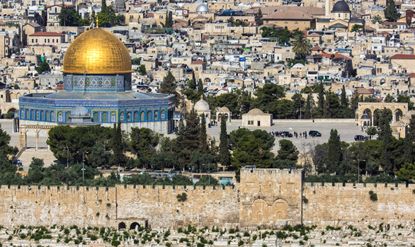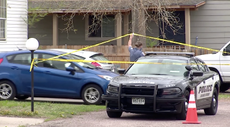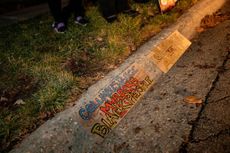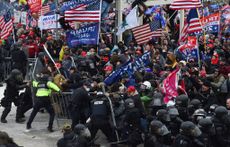The struggle over the Temple Mount
Rumors that Israel will take over Temple Mount have infuriated Palestinians, fueling a new wave of violence

Rumors that Israel will take over Temple Mount have infuriated Palestinians, fueling a new wave of violence. Here's everything you need to know:
Why is the site so important?
The Temple Mount is holy to both Muslims and Jews, and to Christians as well. A rectangular platform covering 35 acres of Jerusalem, it is revered by Jews as the place where God gathered together the dust to create Adam and where Abraham almost sacrificed his son Isaac. In about 1000 B.C., King Solomon built the First Temple there. That structure was destroyed by the Babylonians, and the Second Temple was built in 516 B.C. and destroyed by the Romans in 70 A.D. The inner sanctuary of the temple, which housed the Ark of the Covenant, was called the Holy of Holies, a place where only the high priest was allowed to set foot. Since nobody knows exactly where the sanctuary stood, religious Jews are forbidden even today from entering the entire compound. They pray instead at the Western Wall, a remnant of the Second Temple's outer courtyard.
Subscribe to The Week
Escape your echo chamber. Get the facts behind the news, plus analysis from multiple perspectives.

Sign up for The Week's Free Newsletters
From our morning news briefing to a weekly Good News Newsletter, get the best of The Week delivered directly to your inbox.
From our morning news briefing to a weekly Good News Newsletter, get the best of The Week delivered directly to your inbox.
Why is it holy to Muslims?
Called the Noble Sanctuary by Muslims, the site is the third holiest place in Islam, after Mecca and Medina. The Quran says that the Prophet Mohammed took a miraculous night journey to Jerusalem on a winged horse in 621. There, he ascended to heaven and spoke with Allah, before returning to Mecca the same night. It was on this journey that Mohammed received from Allah many of the main tenets of Islam, such as the requirement to pray five times a day. After the Muslim conquest of Jerusalem in 637, the Umayyad caliphs built the Al-Aqsa Mosque and the beautiful Dome of the Rock — the gold-domed structure that is Jerusalem's most recognizable monument — on the site. The dome is said to be on the site where Mohammed rose to heaven, while the mosque is where he first arrived in Jerusalem.
Who governs the Temple Mount?
Muslims have controlled access to the site since 1187, when Arabs took back Jerusalem from the Crusaders. An Islamic trust, or waqf, administered the site, and Jews were not allowed to enter. After the Six-Day War in 1967, the Temple Mount area became part of occupied Israeli territory. The defense minister at the time, Moshe Dayan, met with Muslim leaders and reached a new agreement. The waqf would continue to administer the Noble Sanctuary, but Jews would be allowed to enter the site as tourists, but could not pray there.
Has that arrangement worked?
It has been the source of great friction, with zealots on both sides objecting to the status quo. Far-right, ultra-Zionist groups associated with the late Rabbi Meir Kahane have for decades demanded that Jews be allowed to pray on the Temple Mount — something forbidden in the Talmud as well as by the Israeli Supreme Court. In 1982, Alan Goodman, an American Jewish radical and an Israeli soldier, burst into the Dome of the Rock and started spraying machine-gun fire, killing two people. He served 15 years in prison. After that, tensions remained high and Muslims periodically threw rocks at Jews praying at the Western Wall. In 2000, the late Prime Minister Ariel Sharon, then leader of the opposition, and Reuven Rivlin, who is now Israel's president, made a very public visit to the Temple Mount, surrounded by hundreds of Israeli police, to demonstrate Israelis' right to go there. Palestinians rioted across Jerusalem, and the Second Intifada erupted.
How did the current violence start?
Late last year, one of the radical rabbis who advocated Jewish control of the Temple Mount was shot in an assassination attempt by a Palestinian, who was later killed by Israeli forces. Violent clashes followed, and Israeli security briefly closed off access to the site. Palestinian Authority President Mahmoud Abbas called that closure "a declaration of war." Ever since, rumors have spread among Palestinians and the Palestinian media that Israel is planning to take over administration of the entire complex. Prime Minister Benjamin Netanyahu's government has consistently denied that, and the Israeli Supreme Court has repeatedly ruled that Jews may not pray there, but belief in an Israeli takeover has incited a recent spate of knife attacks on Jews. Palestinians say that increases in the Jewish population in Arab neighborhoods of East Jerusalem and new archaeological digs in the Temple Mount area "all seem to send the message that 'We are here to stay, we are here to rule, this belongs to us,'" says Hussein Ibish of the American Task Force on Palestine.
How has Israel responded?
It is trying to crack down on the zealots on both sides. Last week, Israeli police banned prominent right-wing activist Dov Morel not just from the Temple Mount but also from the entire city of Jerusalem for six months. Israeli security also shut down a Palestinian radio station that it said was encouraging attacks on Jews, and it set up checkpoints in Palestinian neighborhoods of East Jerusalem. But Abbas has continued to assert that the Netanyahu government is in league with far-right groups and is trying to change the status of the Temple Mount. As long as this "deceitful propaganda" continues, says Israeli writer Akiva Eldar, "it is the average person, Israeli and Palestinian alike, who will end up suffering the most."
Denying the Temples existed
The waqf forbids archaeological digs on the Temple Mount/Noble Sanctuary, because it is holy ground and an active site of worship. But in 1996, the waqf made an alteration to the sanctuary, converting the Templar-era structure known as Solomon's Stables into a mosque. Hundreds of tons of soil and rocks were trucked out during the construction, and Israeli historians were outraged. Israeli authorities later found many Jewish Temple relics in the dirt trucked from the site, including coins with Hebrew writing that refer to the Temple. The waqf was widely accused of attempting to hide evidence of the existence of the Jewish Temples, which many Palestinian leaders say never existed. That debate continues to rage. "The Aqsa Mosque was an Islamic mosque since the world was created," said Sheikh Muhammad Ahmad Hussein, the grand mufti of Jerusalem, just last month. "It was never anything other than a mosque."
Sign up for Today's Best Articles in your inbox
A free daily email with the biggest news stories of the day – and the best features from TheWeek.com
-
 Gunman kills 6, himself at Colorado Springs birthday party
Gunman kills 6, himself at Colorado Springs birthday partySpeed Read
By Peter Weber Published
-
 Columbus police fatally shoots Ma'Khia Bryant, 16, quickly releases body-cam footage
Columbus police fatally shoots Ma'Khia Bryant, 16, quickly releases body-cam footageSpeed Read
By Peter Weber Last updated
-
 Austin police, feds searching for ex-sheriff's deputy accused of killing 3, in Sunday's 2nd mass shooting
Austin police, feds searching for ex-sheriff's deputy accused of killing 3, in Sunday's 2nd mass shootingSpeed Read
By Peter Weber Last updated
-
 At least 8 dead in Indianapolis FedEx shooting
At least 8 dead in Indianapolis FedEx shootingSpeed Read
By Peter Weber Last updated
-
 Scalise says GOP will 'take action' on Gaetz if DOJ moves ahead with 'formal' case
Scalise says GOP will 'take action' on Gaetz if DOJ moves ahead with 'formal' caseSpeed Read
By Catherine Garcia Last updated
-
 Watchdog report: Capitol Police knew about potential for violence on Jan. 6, but held back
Watchdog report: Capitol Police knew about potential for violence on Jan. 6, but held backSpeed Read
By Catherine Garcia Published
-
 Former classmate arrested in 1996 disappearance of college student Kristin Smart
Former classmate arrested in 1996 disappearance of college student Kristin SmartSpeed Read
By Catherine Garcia Published
-
 Report: Gaetz associate has been cooperating with federal investigators since last year
Report: Gaetz associate has been cooperating with federal investigators since last yearSpeed Read
By Catherine Garcia Last updated


